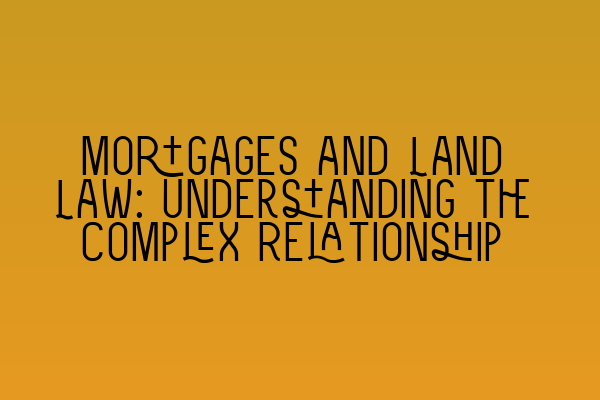Mortgages and Land Law: Understanding the Complex Relationship
Welcome to SQE Property Law & Land Law, a trusted solicitor firm that specializes in providing expert advice on all matters related to property law. In this blog post, we will delve into the intricate relationship between mortgages and land law, shedding light on the complexities of this subject. By the end of this article, you will gain a better understanding of how mortgages are governed by land law and how they impact property ownership.
Before we dive into the details, it’s essential to clarify the basic concepts of mortgages and land law. A mortgage is a legal instrument used to secure a loan for the purchase of property. It involves two parties: the mortgagee, who lends the money, and the mortgagor, who borrows the money and pledges their property as collateral. Land law, on the other hand, deals with the legal rights and interests in property, including ownership, possession, and transfer.
Now that we have the groundwork laid out, let’s explore how mortgages and land law intersect. Land law provides the framework for the creation, transfer, and enforcement of mortgages. It ensures that both the mortgagee and the mortgagor have clear rights and obligations within the scope of this legal arrangement.
One crucial aspect of the relationship between mortgages and land law is the concept of security. When a mortgage is granted, the property becomes a security interest for the mortgagee to recover their debt if the mortgagor defaults on their loan payments. Land law sets out the procedures and requirements for creating valid and enforceable security interests, protecting the rights of both parties involved.
When a mortgage is granted, it is usually in the form of a legal document known as a mortgage deed. The mortgage deed outlines the terms and conditions of the loan, including the repayment schedule, interest rate, and any additional charges or fees. Land law governs the validity and enforceability of these mortgage deeds, ensuring that they comply with legal requirements and are recorded appropriately.
In the event that the mortgagor defaults on the loan, land law grants the mortgagee the right to enforce their security interest. This means that the mortgagee can seek legal remedies, such as repossession and sale of the property, to recover their debt. The procedures for enforcing a mortgage and recovering the outstanding debt are strictly regulated by land law to protect the mortgagor’s rights and ensure fairness in the process.
It is important to note that land law also plays a crucial role in determining the priority of mortgages. When multiple mortgages exist on the same property, land law establishes a hierarchy to determine which mortgage takes precedence in case of default. This priority is usually based on the date of registration or creation of the mortgages, ensuring fairness and clarity in the rights and obligations of all parties involved.
In conclusion, understanding the complex relationship between mortgages and land law is essential for anyone involved in the property market. As a solicitor firm specializing in property law, SQE Property Law & Land Law is uniquely positioned to provide expert advice and guidance on all aspects of mortgages and land law. Whether you are a mortgagee, mortgagor, or simply seeking a comprehensive understanding of this subject, our team of experienced solicitors is here to assist you.
If you found this article helpful, we invite you to explore our website for more valuable resources related to SQE preparation, including practice exam questions and mock tests. If you have any questions or would like to discuss your specific legal needs, please do not hesitate to contact us. We are dedicated to providing the highest quality service and helping you navigate the intricate world of property law.
Related Articles:
– SQE 1 Practice Exam Questions
– SQE 1 Practice Mocks FLK1 FLK2
– SQE 2 Preparation Courses
– SQE 1 Preparation Courses
– SRA SQE Exam Dates
